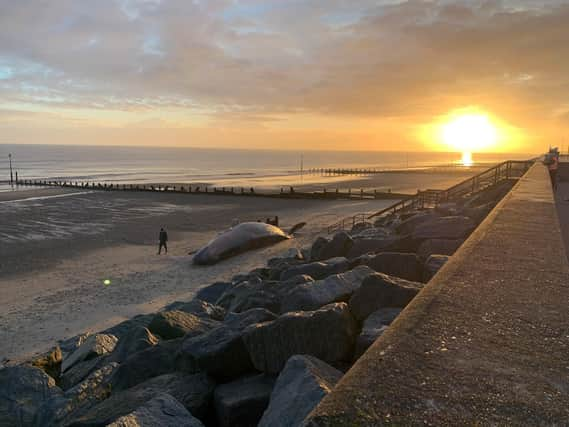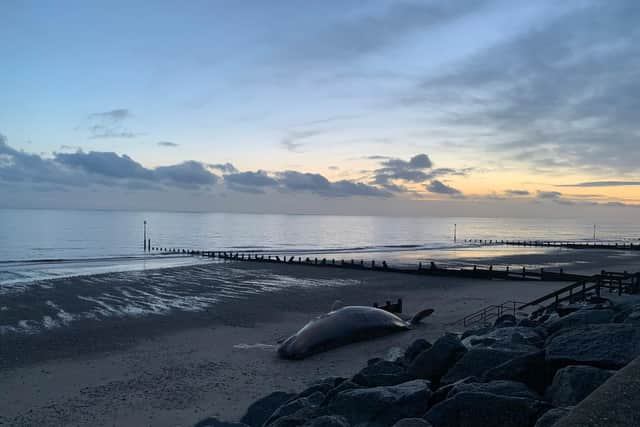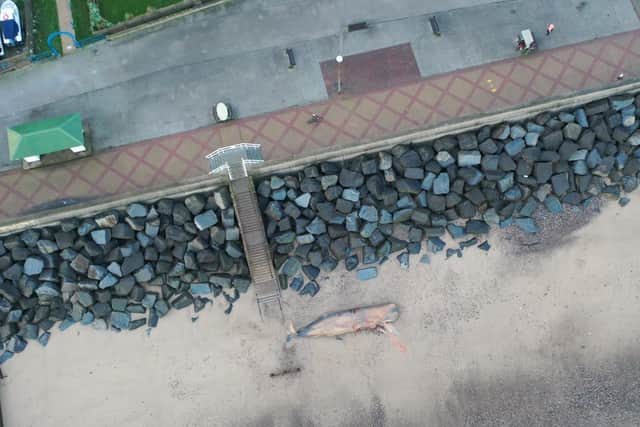Postmortems and removal of stranded Withernsea sperm whales to take place as council admit onlookers have been climbing on their carcasses


The pod of juvenile males, all in poor condition and badly nourished, became stranded on Christmas Eve and 10 were confirmed to have died. As the animals are so large, it is almost impossible to treat or rescue them once they have beached.
East Riding Council has also confirmed that groups of onlookers were seen climbing on the mammals' carcasses after Humberside Police had warned crowds to stay away from the scene.
Advertisement
Hide AdAdvertisement
Hide AdRob Deaville and Matt Perkins from the Cetacean Strandings Investigation Programme, based at the Institute of Zoology in London, have now travelled to Withernsea to examine five of the corpses that remain on the beach and take samples from them. A full autopsy can only take place if a whale has not reached a stage of advanced decomposition.


Mr Deaville revealed that parts of the jaws of two of the whales known as mandibles had been removed from their bodies by sick 'trophy hunters', making examination more difficult.
The corpses were disturbed by visitors - some thought to have travelled from as far as Birmingham - despite Coastguard patrols and a safety cordon, and parents were seen taking photographs of children posing on the decomposing carcasses, which contain bacteria that can spread zoonotic diseases.
It is thought the animals made a wrong turning out of Norway, where there is a deep trough where they can feed on squid. Instead of continuing through to the North Atlantic they ended up in the shallow North Sea where there is no food for them and have starved.
Advertisement
Hide AdAdvertisement
Hide AdAdults can eat almost 2,000 pounds of food a day and to find their prey - preferably giant squid - they dive somewhere between 300 and 1,200 metres.


Local councillor David Tucker said: “It beggars belief that you would drive 400 miles to come and see a dead mammal on a beach.”
He said the council would pick up the bill for the whale’s removal, adding: “It’s a public health issue.”
East Riding Council said: "Following scientific testing on several deceased whales on the coast, between Tunstall and Withernsea, the council is working with partners and sourcing a specialist contractor to remove the whale nearest to Withernsea’s South Promenade.
Advertisement
Hide AdAdvertisement
Hide Ad"This work will happen in the coming days and will see a section of the promenade cordoned off. For public safety, we urge people to stay away from the animals and to avoid the area.
"The council is aware of reports of people getting close to the animals, touching them and even climbing on them. What happened is a tragedy and we ask people to be respectful while work is undertaken to move them off the beach or for nature to take its course."
A statement from the charity British Divers Marine Life Rescue said: "These animals are far outside of their normal habitat, which is in waters over 2,000 metres deep off the west coast of the UK, and in the shallow North Sea they have very limited options for food.
"Many of the animals involved were in poor nutritional condition as a result and clearly would not have survived long if they had refloated alive on the tide. Due to the large size and weight of these animals there are no safe methods for lifting and moving live animals of almost 20 metres in length and up to 80 tonnes in weight, nor are there any safe and effective methods available for putting them to sleep either.
Advertisement
Hide AdAdvertisement
Hide Ad"Further reports of more whales at Spurn Point have been checked and nothing has been found. We can only hope that there are no more whales still in the area that might yet come ashore.
"We would like to extend our heartfelt thanks and gratitude to all of our team involved on the ground and behind the scenes in this awful situation, as well as our colleagues in the Maritime and Coastguard Agency who have been on scene dealing with these tragic and difficult circumstances."
The whales will either be taken to a landfill site for disposal or incinerated.
Comment Guidelines
National World encourages reader discussion on our stories. User feedback, insights and back-and-forth exchanges add a rich layer of context to reporting. Please review our Community Guidelines before commenting.